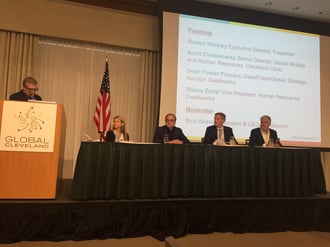This past Wednesday, students and professionals from across the Cleveland area gathered to educate one another on the importance of globalization in the workplace. The event, hosted by Global Cleveland, featured a variety of innovation, kicking off with two interactive panels focused on global economy and international talent, which was followed by a showcase of student pitches. In the afternoon, participants had the opportunity to attend two of five Breakout Sessions, each of which focused on a specialized area of intercultural integration. Topics included the plight of keeping young talent in Cleveland, the nature of global teams in today’s ever-changing business climate, and the relevance of immigration trends in global business. Each presentation featured a panel of experts in industries ranging from relocation services to legal practices, but their nuanced missions shared a common message: workplace globalization is crucial.
Unfortunately, this revelation has the potential to leave many professionals in an uncertain state. It begs the question: what happens once businesses globalize? How do they help employees assimilate to the integration of new cultures? When left unanswered, it’s questions like these that discourage businesses from globalization despite its many benefits.

This led global mobility experts at Dwellworks, the Cleveland Clinic, and Fragomen to put their heads together and tackle the maintaining and developing of global teams in their Global Cleveland Breakout Session. The panel pointed to “cultural agility” as the solution. A combination of awareness, understanding, and managing, cultural agility fosters global teams who understand their differences, cultural or otherwise. As the panel pointed out, true intercultural teamwork is no longer about overcoming differences; it’s about understanding the advantages of new perspectives. They later pivoted to the logistical concerns of the process, touching on the sourcing, managing, and moving of international talent.
“Having a global mindset is the same as having a diverse team,” explained Dwellworks President and CEO, Bob Rosing. “Both are economic imperatives.”
Those who attended the event had a lot to say about the timeliness of Global Cleveland’s subject matter.
“Considering today’s political climate, this event brought a lot of much needed awareness to an increasingly global world,” commented attendee Sarah Jordan. She went on to explain that she appreciated the juxtaposition of local and global focal points and believes that events such as this could be just as effective in other cities. “It’s a fantastic opportunity to see where globalization is taking the business world.”
Both on a local and global scale, the relevance of this event cannot be ignored. Those who attended better understand the untapped potential of global talent and now have the power to act as ambassadors for the cause. Beyond this, dialogue surrounding workplace globalization looks to the future and establishes Cleveland as an epicenter for inclusivity and progression. It is important that Cleveland and other metropolitan areas continue to work towards development beyond these conversations. It is not enough to simply understand the importance of globalization in the workplace; businesses must deliver by applying cultural agility, leveraging differences, and welcoming global employees and practices into the professional world.
Want to learn more about global teams? Check out our blog post, Why Do Global Teams Fail?


